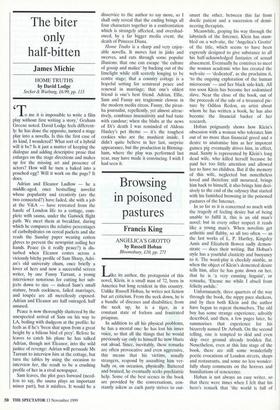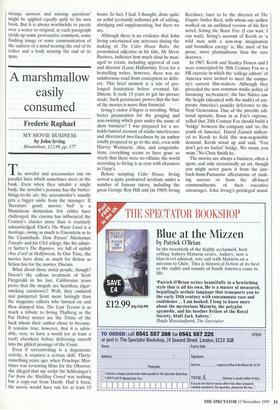Browsing in poisoned pastures
Francis King
ANGELICA'S GROTTO by Russell Hoban Bloomsbury, £10, pp. 271
Like its author, the protagonist of this novel, Klein, is a small man of 72, born in America but long resident in this country. Unlike Russell Hoban, he writes not fiction but art criticism. From the neck down, he is a bundle of diseases and disabilities; from the neck up, he is a tiger, in a constant state of forlorn and frustrated priapism.
In addition to all his physical problems, he has a mental one: he has lost his inner voice, so that all the things that he would previously say only to himself he now blurts out aloud. Since, inevitably, these remarks are often provocative and even aggressive, this means that his victims, usually strangers, respond by assaulting him ver- bally or, on occasion, physically. Battered and bruised, he eventually seeks psychiatric help. Some of the best scenes in the book are provided by the conversations, con- stantly askew as each party strives to out-
smart the other, between this far from docile patient and a succession of domi- neering therapists.
Meanwhile, groping his way through the labyrinth of the Internet, Klein has stum- bled on a web-site, the 'Angelica's Grotto' of the title, which seems to have been expressly designed to give substance to all his half-acknowledged fantasies of sexual abasement. Eventually he contrives to meet the woman academic who has created the web-site — 'dedicated', as she proclaims it, 'to the ongoing exploration of the human microcosm' — and her black side-kick. All too soon Klein has become her sodomised slave. Near the close of the book, out of the proceeds of the sale of a treasured pic- ture by Odilon Redon, an artist about whom he has written a book, he has also become the financial backer of her research.
Hoban poignantly shows how Klein's obsession with a woman who tolerates him out of no more than financial greed and a desire to anatomise him as her impotent guinea pig eventually drives him, in effect, mad. Sanity is represented by Klein's long dead wife, who killed herself because he paid her too little attention and allowed her to have no children. But if the memory of this wife, neglected but nonetheless loved and therefore still mourned, brings him back to himself, it also brings him deci- sively to the end of the odyssey that started with his famished browsing in the poisoned pastures of the Internet.
In so far as it is concerned so much with the tragedy of feeling desire but of being
unable to fulfil it, this is an old man's novel; but in every other respect it reads like a young man's. When novelists get arthritic and flabby, so all too often — as the last works of L. P. Hartley, Kingsley Amis and Elizabeth Bowen sadly demon- strate — does their writing. But Hoban's style has a youthful elasticity and buoyancy to it. The word-play is cheekily nimble, as
when the object of Klein's demented desire tells him, after he has gone down on her, that he is 'a very cunning linguist', or remarks, 'Excuse me while I abseil from felicity awhile.'
Unfortunately, three quarters of the way through the book, the nippy pace slackens, and by then both Klein and the author have begun to repeat themselves. The old boy has some strange experience, adroitly described, and then, a few pages later, he summarises that experience for his bizarrely named Dr Arbuth. On the second telling, one is tempted to skid and even skip over ground already trodden flat. Nonetheless, even at this late stage of the book, there are still some wonderfully poetic evocations of London streets, shops and restaurants, and some no less wonder- fully sharp comments on the horrors and humiliations of senescence.
Hoban is not always an easy writer, so that there were times when I felt that his hero's remark that 'the world is full of strange answers and missing questions' might be applied equally aptly to his own book. But it is always worthwhile to puzzle over a writer so original, as each paragraph yields up some provocative comment, some flashing image or some communication of the sadness of a mind nearing the end of its tether and a body nearing the end of its span.



























































































 Previous page
Previous page